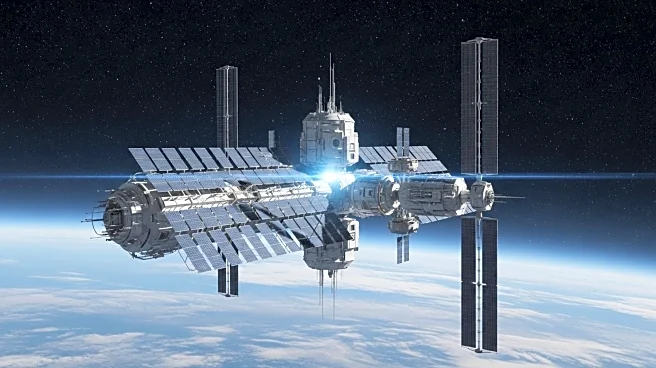What's Happening?
The Royal Society has released a report examining the potential implications of space activities by 2075, aiming to stimulate discussion on the transformative impact of space exploration on industry, society, and culture. The report highlights advancements in reusable rockets, spaceplanes, and green propellants, which could lower costs and increase access to orbit. These innovations may enable large-scale orbital manufacturing and point-to-point suborbital transport on Earth. Developments in robotics, AI, computing, and synthetic biology are expected to transform human life, with space-based power systems supporting orbital factories and clean energy transmission to Earth. The report emphasizes the need for international agreements on space traffic management and debris minimization, and the importance of equitable and sustainable access to space.
Why It's Important?
The report underscores the significance of preparing for the opportunities and risks presented by increased space activities. The potential for large-scale orbital manufacturing and resource extraction could mitigate environmental challenges on Earth, while space-based power systems may offer clean energy solutions. The report also highlights the geopolitical implications of space activities, with the growing number of state and non-state actors increasing competition for orbital slots and radio frequencies. International collaboration is deemed vital for the safe and equitable use of space, with robust protocols needed to prevent conflict and ensure reliable communication.
What's Next?
The report suggests that technologies developed for lunar bases could pave the way for Martian facilities, requiring greater operational independence due to Mars' distance. Innovations in engineering biology and biotechnology could support long-term human presence on Mars, with applications on Earth in waste recycling, healthcare, and food production. The possibility of individuals born on the moon or Mars raises ethical questions regarding nationality and physiological adaptation. Autonomous robotic systems may construct interplanetary stations for exploring Venus, Europa, and beyond, supported by advanced communication networks.
Beyond the Headlines
The report explores the ethical, health, and safety frameworks required for a lunar economy with human workers in remote environments. It also considers the scientific and philosophical insights that may arise from planetary sciences and astrobiology, potentially reshaping our understanding of life beyond Earth. The report emphasizes the need for early awareness of long-term trends to prepare society for unexpected challenges and make informed choices to sustainably benefit from the combination of Earth and space environments.












